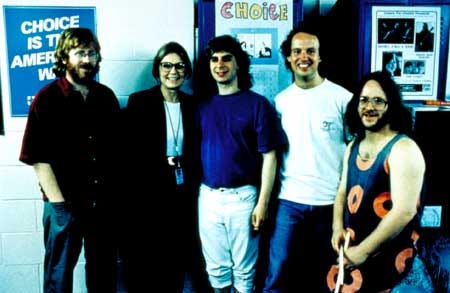
Phish ended their five-and-a-half months off at the start of 1995 in very uncharacteristic fashion, headlining an explicitly political event: a Voters for Choice benefit hosted by feminist icon Gloria Steinem. But musically, they broke their fast in very characteristic fashion, playing a set dominated by song debuts both original and covered. Of the 14 songs played in this one-set show, 10 had never been played before a live audience — it’s on par with the Wingsuit or Kasvot Växt sets for unveiling fresh material. And with three weeks remaining until their touring year officially kicked off, this show looks like a prologue to what many consider their first musical peak.
But if a good prologue sets up the narrative that follows, this new song drop is partially a misdirection for the rest of 1995. The Phish that would close out the year with a triumphant coronation of a show at Madison Square Garden had miraculously found a way to adapt their quirky songwriting and adventurous new improv to an arena setting, with only faint compromise. The Phish that started the year sharing a bill in this tiny 2800-seat auditorium with forgotten acts Jennifer Trynin and Emergency Broadcast Network appeared to be doubling down primarily on the quirky part, course-correcting from the mainstream overtures of the spring prior.
Consider Ha Ha Ha, a composition by Mr. Jonathan Fishman that is entirely made up of a hard-rock riff and deadpan laughter. Or Glide II, the sequel to a contortionist composition from A Picture of Nectar that recycles sections from Guyute and wouldn’t get a second performance until 23 years later. Or Spock’s Brain, a bizarre full-band composition that sounds like they used an Exquisite Corpse game to craft both its lyrics and musical progression — one of its alternate title options was the very tongue-in-cheek “The First Single”. Any of these songs would’ve stuck out on Hoist like a guy wearing jeans to a wedding.
That trio was almost immediately reassigned to rarity status in the Phish catalog, but even the future staples debuting on this night mark a detour from their recent songwriting trajectory (represented here by a late-set, obligatory Sample). Both Theme from the Bottom and Free would eventually become prime examples of Phish’s singular arena-rock formula, but their maiden voyages likely sounded just as perplexing as Spock’s Brain at the time — certainly long, like the fan favorites Reba and YEM sprinkled into this set, but neither through-composed epics nor (as of yet) platforms for extended improvisation.

Theme sounds surprisingly mature right out of the box, with Trey even nailing the ornate pre-solo guitar part that would torment him for decades to come. But it’s a song that finds its emotional climax in a new way for Phish — not in the resolution of a composed musical knot or tension/release improvisation, but instead with a mantra-like wall of sound, all four members singing an overlapping phrase over windmilling power chords. It’s codifying in song form the discovery that sparked in fall 1994, the realization that texture, simplicity, and repetition can be as powerful as melody and shredding.
Then there’s Free, which isn’t quite fully baked on its debut, and wouldn’t reach its final form for at least a couple more years. Free is built around, in my opinion, Trey’s greatest riff, a triumphant, paragraph-length phrase that acts as a perfect large-venue fist-pumper — it’s the end riff of Disease, but moved up to the front of the song. But while the riff is intact, the anthemic effect isn’t totally weaponized yet. Early versions feel a little undercooked, with a drum part that sounds like a placeholder. For now, Page, Mike, and Fish sound adrift in the jam section where Trey will soon unveil his divisive mini percussion kit as a strategy to step back from the conductor stand. Here too, there’s an emphasis on atmosphere, with Trey’s looped waves of tinnitus noise the center of attention.

The night’s covers would foreshadow even stranger futures. Don’t You Want To Go?, a spiritual popularized by The Meditation Singers, is an earnest attempt at gospel that’s redundant with Daniel Saw The Stone and wouldn’t survive the year; Gloria is a one-off tribute to Steinem. But the other two offer a portal into Phish at the end of the decade, a literal sneak preview of the 1998 Halloween set in Fishman’s performance of the Velvet Underground’s Lonesome Cowboy Bill and, most tantalizingly, a one-time-only cover of Brian Eno’s I’ll Come Running.
Because if you’re going to start experimenting with texture, why not consult the guru? I’ll Come Running is at the heart of Another Green World, one of the milestones on Eno’s 70s path of rock and roll deconstruction, the halfway point between the art-glam of Here Come The Warm Jets and the genre-defining Music For Airports. The song itself is pretty straightforward, and Phish’s Mike-sung version very by-the-books, but it’s a symbolic gesture of where Phish’s music was headed. Take a back seat, Zappa, Eno is riding shotgun now.
But the funny thing is, that influence won’t be obvious for at least another year and a half, when Phish covers the Eno-produced Remain in Light, or maybe even 1998, when the band’s mutant funk-Hendrix hybrid decomposes into their most minimalist and atmospheric phase. So if 5/16/95 is a prologue, it’s not so much for the rest of 1995, but for the long, epic journey to Phish 2000 and the first hiatus. In the shorter term, there are other dragons to slay.
It’s good to be back! Hope everyone out there is safe and well. Please help spread the word about the newsletter, which will resume high-frequency posting June 7th for summer tour proper.


